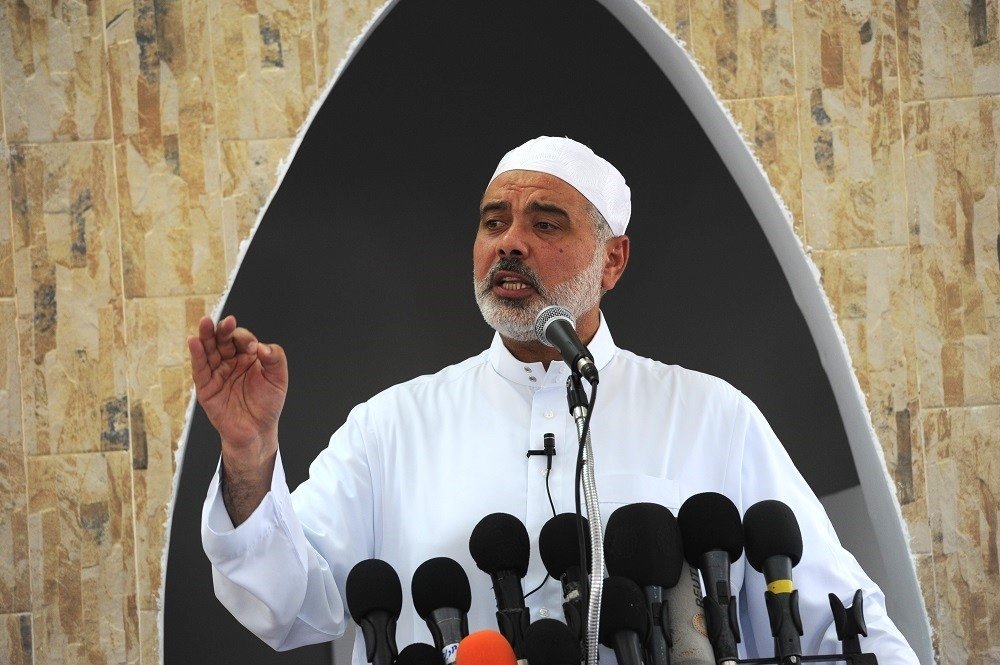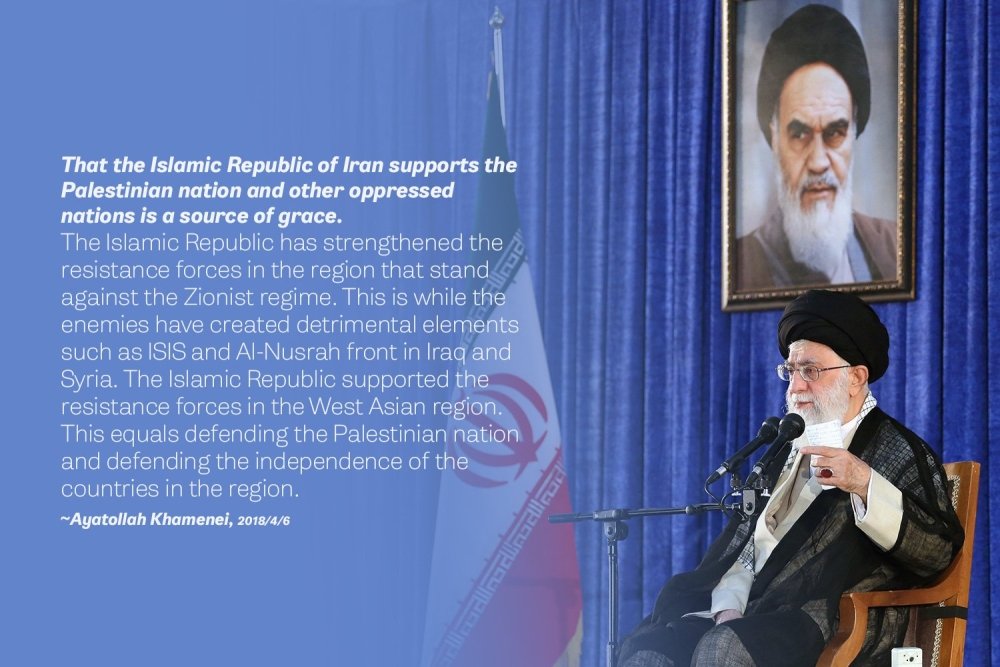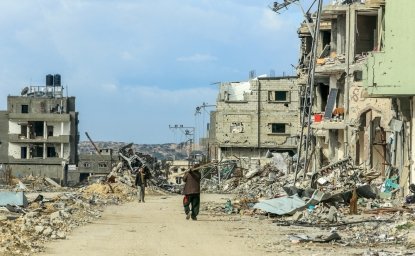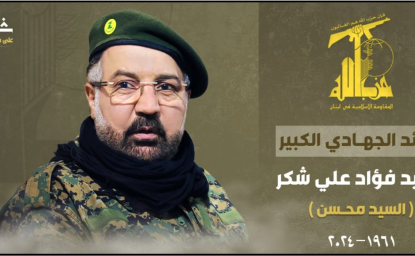The Life and Death of Ismail Haniyeh
The Hamas leader was assassinated on July 31 during a visit to Tehran.
The Hamas leader was assassinated on July 31 during a visit to Tehran.

Ismail Haniyeh, the political leader of the exiled wing of Hamas and its chief negotiator on issues of war and peace, was assassinated on July 31 during a visit to Tehran for the inauguration of President Masoud Pezeshkian. He had also met just hours earlier with Supreme Leader Ayatollah Ali Khamenei, a sign of Haniyeh’s standing with Iran. The stunning attack, widely assumed to be by Israel, evoked rage in Iran and from its network in the so-called Axis of Resistance. In a statement, the armed wing of Hamas said the assassination would “take the battle to new dimensions and have major repercussions.” Khamenei said Iran had a duty to avenge Haniyeh’s death and warned Israel of “harsh punishment.”
Iran said Washington shared responsibility for Haniyeh’s killing because of its military support for Israel before and during the Gaza War. From Singapore, Secretary of State Antony Blinken denied that the United States had been either forewarned or involved in the attack.
The assassination reflected escalating tensions across the Middle East. Just a day earlier, on July 30, an Israeli airstrike on southern Beirut killed Fuad Sukr, a senior Hezbollah commander linked by Israel to the attack on the Druze village of Majdal Shams in the Israeli-occupied Golan Heights, which had killed 12 children or teenagers on July 27. The escalation between Israel and Iran’s network of allies coincided with a US airstrike on an Iranian-backed militia in Iraq on July 30—the first since February. The Pentagon claimed that fighters in the Popular Mobilization forces were preparing strikes against US forces based in Iraq and neighboring Syria to prevent ISIS from retaking territory—an operation unrelated to the Arab-Israel conflict.
Haniyeh had survived an assassination attempt in 2003 when he was a prominent aide to Sheikh Yassin, the founder of Hamas, in Gaza. In April 2024, three of his sons -- Hazem, Amir and Mohammad -- were killed in an Israeli airstrike on northern Gaza. Haniyeh’s deputy Saleh al Arouri was killed in January by Israel. His sister and her family were killed in an airstrike in June.
In January 2020, Haniyeh delivered a eulogy at the funeral of General Qassem Soleimani, the commander of the external operations arms of the Iranian Revolutionary Guards. Soleimani, killed in a US airstrike in Baghdad, played a key role in building the military capabilities of Iranian allies and proxies across the Middle East. What Soleimani “provided to Palestine and the resistance has brought them to the position they are in today in terms of power and steadfastness,” Haniyeh said in Tehran. During the visit, Haniyeh also met with Soleimani’s successor, Brigadier General Esmail Ghaani, the new head of the Qods Force.
The Haniyeh assassination interrupted months of negotiations involving Israel, the United States, Egypt and Qatar over terms to end the Gaza war and free dozens of Israeli hostages held since the Hamas invasion of Israel on Oct. 7, 2023. Qatari Prime Minister Sheikh Mohammed bin Abdulrahman al Thani, a major player in the negotiations and an interlocutor with Hamas, warned Israel that “political assassinations and continued targeting of civilians in Gaza while talks continue leads us to ask, how can mediation succeed when one party assassinates the negotiator on other side?” The following sections cover reaction to the assassination, biographic material on Haniyeh, and background on Hamas ideology.
Sami Abu Zuhri on July 31, 2024: “This assassination by the Israeli occupation of Brother Haniyeh is a grave escalation that aims to break the will of Hamas and the will of our people and achieve fake goals. We confirm that this escalation will fail to achieve its objectives.”
“Hamas is a concept and an institution and not persons. Hamas will continue on this path regardless of the sacrifices and we are confident of victory.”
Hamas Spokesperson Khalil al Hayya on July 31, 2024: Israel will “pay the price for a heinous crime.”
Qassam Brigades on July 31, 2024: Haniyeh’s killing “will take the battle to new dimensions and have major repercussions."
Supreme Leader Ayatollah Ali Khamenei on July 31, 2024: “The brave leader and prominent Palestinian mujahid, Mr. Ismail Haniyeh, joined his Creator in the early hours at dawn, and the great Resistance Front is mourning his loss. The criminal, terrorist Zionist regime martyred our dear guest in our territory and has caused our grief, but it has also prepared the ground for a severe punishment.
“Martyr Haniyeh was willing to sacrifice his honorable life in this dignified battle for many years. He was prepared for martyrdom and had sacrificed his children and loved ones on this path. He was not afraid of being martyred on the path of God and in order to save the lives of God’s servants. However, following this bitter, tragic event which has taken place within the borders of the Islamic Republic, we believe it is our duty to take revenge.
“I offer my condolences to the Islamic Ummah, the Resistance Front, the courageous, proud people of Palestine, and in particular to the family and loved ones of Martyr Haniyeh and of one of his companions who was martyred beside him. May Almighty God elevate their ranks.”
President Masoud Pezeshkian on July 31, 2024: “The bond between the two proud nations of Iran and Palestine will be stronger than before, and the path of resistance and defense of the oppressed will be followed stronger than ever. The Islamic Republic of Iran will defend its territorial integrity, honor, pride and dignity, and make the terrorist invaders regret their cowardly action.”
Islamic Revolutionary Guard Corps (IRGC) on July 31, 2024: “The heinous crime committed by the Zionist regime in killing Ismail Haniyeh, head of Hamas's political bureau, will undoubtedly be met with a harsh and painful response from the powerful Resistance Front."
Foreign Ministry Spokesperson Nasser Kanaani on July 31, 2024: “Undoubtedly, the pure blood of this noted mujahid who honorably campaigned against the usurper Zionist regime in liberating the holy Quds and freeing the oppressed Palestinian nation from the clutches of Zionist occupiers will never go in vain.”
“As a supporter and accomplice of the Zionist regime in the continuation of the occupation and genocide of Palestinians, the US government is responsible in committing this heinous act of terrorism.”
Hezbollah statement on Telegram on July 31, 2024: “We in Hezbollah share with our dear brothers in the Hamas movement all the feelings of pain over the loss of this great leader, the feelings of anger at the enemy’s crimes, the feelings of pride that the leaders in our movements are leading their people and their mujahideen to martyrdom.”
Deputy Secretary General Muhammad al Hindi on July 31, 2024: “This assassination is not only directed at the Palestinian resistance and Hamas, in particular, but it is also directed at Iran.”
“Israel is on the verge of collapse, and its reactions reflect confusion and inability to achieve any of its goals. Israel is facing such resistance for the first time in its history.”
Supreme Revolutionary Committee head Mohammed Ali al Houthi on July 31, 2024: “Targeting Ismail Haniyeh is a heinous terrorist crime and a flagrant violation of laws and ideal values.”
Haniyeh’s family fled from al Majdal Asqalan, in what is now Ashkelon in southern Israel, during the 1948 Arab-Israeli War. Born in 1962 in the Shati refugee camp in Gaza, he joined the Islamic Student Bloc while a student in 1984. He graduated with a degree in Arabic literature from the Islamic University in Gaza in 1987. When the First Intifada broke out, he participated in anti-Israel protests and was a founding member of Hamas. He spent six months in an Israeli prison in 1988 and another three years beginning in 1989. In 1992, Israel deported him and hundreds of other Palestinian militants to Lebanon.
After the PLO signed the Oslo Accord with Israel in 1993, Haniyeh returned to Gaza to head the Islamic University. He quickly climbed the ranks within Hamas. In 2001, he became the third-highest ranking official. In 2006, he headed the Hamas list in its first run for parliament. After Hamas upset the secular Fatah Party, Haniyeh was appointed prime minister of the Palestinian Authority. Hamas forced Fatah—its political officials and security forces -- out of Gaza in 2007. Palestinian President Abbas dismissed him, but Haniyeh remained the de facto leader of Gaza until Hamas leaders elected him to head the 15-person Politburo in 2017, when he moved to Qatar. The United States labeled him a “Specially Designated Global Terrorist” in 2018. He left Gaza in 2019 and set up an office in Qatar. Haniyeh was reelected head of the Hamas Politburo in 2021.


Hamas—the Islamic Resistance Movement or Harakat al Muqawama al Islamiyah—is both an Islamist party and a militia based in Gaza. It was founded in 1987 by Sheikh Ahmed Yassin, a popular cleric, as the Palestinian branch of the Muslim Brotherhood. It emerged during the first intifada uprising against the Israeli occupation. Its original charter advocated destroying Israel and establishing an independent Islamic state in historic Palestine. A revised charter, introduced in May 2017, provisionally accepted a Palestinian state based on the 1967 borders.
Hamas has two primary divisions. The political wing governs Gaza and provides social services. The military wing—the Izz ad-Din al Qassam Brigades, named after a Muslim preacher in British-occupied Palestine in the 1930s—targets Israel with rockets, suicide bomb attacks, and cross-border raids. In October 1997, the United States designated Hamas as a Foreign Terrorist Organization.
Iran provides Hamas with financial aid, weapons and training. Their relations converged after the 1990 Gulf War and the US-orchestrated Madrid Peace Conference, which was organized to revive the Israeli-Palestinian peace process. In 1992, at a conference in Tehran, Iran reportedly vowed to give Hamas $30 million annually and provide military training. Hamas later opened an office in Tehran. Ties deepened in 1992 after Israel deported hundreds of Palestinians, including Hamas leaders, to Lebanon. While in Lebanon, Hamas received military training from Hezbollah and the Iranian Revolutionary Guard Corps (IRGC). Between 1990 and 2000, Iranian financial support to Hamas reportedly ranged from $20 million to $50 million annually, even as it maintained ties with Yasser Arafat’s Palestinian Liberation Organization and the Fatah Party—political rivals to Hamas.
In the 2006 legislative elections, Hamas won a majority—76 of the 132 seats, compared to Fatah's 43 seats. It briefly led the Palestinian Authority in both the West Bank and Gaza. In the year after the elections, however, tensions grew between the two largest Palestinian parties. In mid-2007, President Mahmoud Abbas (of Fatah) fired Prime Minister Ismail Haniyeh (of Hamas); Hamas also forcibly assumed control of security in the Gaza strip. These actions resulted in the dissolution of the Palestinian Authority’s unity government and the de facto division of the Palestinian territories into two entities, with Gaza governed by Hamas and the West Bank governed by Fatah.

During this turbulent period, Hamas ties to Iran deepened. In December 2006, Prime Minister Haniyeh visited Tehran, where he met with Supreme Leader Ayatollah Khamenei and President Mahmoud Ahmadinejad. Iran reportedly gave Hamas $250 million. During the 2008 Gaza War—dubbed “Operation Cast Lead” by the Israelis and the “Battle of al Furqan” by Hamas—Iran increased aid, including more advanced rockets, to Hamas. “The victory of the people of Gaza was a miracle of God, and the Islamic Republic definitely has a share in this victory,” said Khaled Mashaal, the Hamas political leader in exile.
The outbreak of the Syrian civil war in 2011 triggered a split between Tehran and Hamas, which backed opposing parties. Iran provided troops and strategic military assistance to prop up President Bashar al Assad, a member of the Alawite minority. Hamas pledged support for the predominantly Sunni opposition. In return, Iran cut off funding to Hamas—reportedly $23 million monthly—in 2012. Hamas was also squeezed in 2013 when the Egyptian military ousted the first Muslim Brotherhood-led government in Cairo and closed tunnels between Gaza and Egypt that Hamas had relied on to smuggle supplies, arms and people. The closures had a sweeping impact on revenue sources for the Hamas government, reportedly reducing its budget by up to 75 percent.
After the split with Syria, Meshaal and other senior Hamas members were forced to leave their long-time base in Damascus. Hamas turned to Qatar for funding and as an alternative headquarters. The partnership with Doha helped to ease some of movement’s financial troubles.
In 2015, tensions between Hamas and Iran also developed when Hamas expressed tacit support for the Saudi-led offensive against the Houthis, a militant rebel group backed by Iran in Yemen.
In August 2017, Iran again began funding Hamas after Saleh al Arouri, the Hamas second-in-command, met with senior Iranian officials. “Relations with Iran are excellent and Iran is the largest supporter of the Izz ad-Din al Qassam Brigades with money and arms,” said Yahya Sinwar, a senior Hamas military leader. “The relationship today is developing and returning to what it was in the old days … This will be reflected in the resistance [against Israel] and in the [Hamas] agenda to achieve liberation.” In the spring of 2018, Hamas officials said relations with Iran were closer than at any time since the Syrian civil war erupted in 2011. In August 2018, Israeli media reported that Iran was transferring some $70 million a year, or $5.83 million a month, to Hamas.
In July 2019, nine Hamas officials, including Arouri, met with Supreme Leader Khamenei in Tehran. Iran reportedly offered to increase monthly transfers to Hamas to $30 million in exchange for information on the location of Israel’s missile stockpiles.
Iranian Brigadier General Amir Ali Hajizadeh boasted that Tehran had provided weapons and technology to Palestinian militant groups, particularly rockets. “In Palestine, they are now using rockets instead of stones,” the commander of the IRGC Aerospace Force and Missile Unit said in January 2021. Hajizadeh claimed that Iran had also taught Palestinian militants how to manufacture their own weaponry. Hamas political leaders acknowledged receiving support from Iran. "I give thanks to those who provided funds and weaponry to the courageous resistance, the Islamic Republic of Iran, [which] has not skimped in extending funds, weaponry, and technology to the resistance," Haniyeh said on a Hamas Telegram channel in May 2021.
Iranian leaders lauded Hamas for its multi-pronged attack on Israel that killed more than 1,000 people in October 2023. Supreme Leader Khamenei called the unprecedented operation “a devastating earthquake” and a “great calamity” for Israel, even though the Palestinian group committed murderous atrocities and hostage seizures of Israeli civilians from homes, streets and even a music festival in central and southern Israel. In a telephone call with Haniyeh, the Hamas political bureau chief, President Ebrahim Raisi called the attack “the fulfillment of the 70-year-old expectation of the Palestinian nation and the Islamic Ummah (nation).”

Learn more about Hamas and how it relates to similarly aligned organizations throughout the region. Read more


The Wilson Center’s Middle East Program serves as a crucial resource for the policymaking community and beyond, providing analyses and research that helps inform US foreign policymaking, stimulates public debate, and expands knowledge about issues in the wider Middle East and North Africa (MENA) region. Read more



